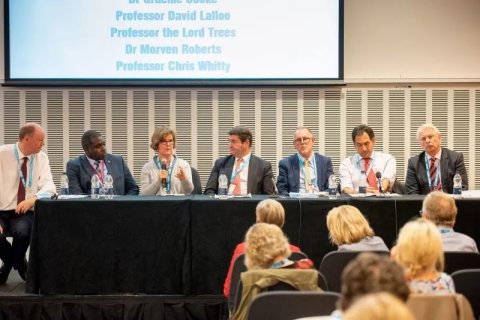Recommendations for RSTMH's work on One Health

We held our Annual Meeting on 16–17 September this year on the theme of One Health. The meeting took place alongside the 11th European Congress on Tropical Medicine and International Health in Liverpool, which RSTMH hosted.
Human and animal health and the environment are all interconnected
The aim of the two days was to feed into the work of the Society on One Health, which along with planetary health is one of our priority thematic areas of focus. We believe that in our ever more interconnected world, we must consider human health alongside animal health and the environment.
As human populations grow, we live in closer contact with animals, giving more opportunities for diseases to spread. Deforestation and intensive farming disrupt our environment and habitats and also provide new opportunities for diseases to pass between humans and animals. Movements of people facilitated by international travel and trade have increased means of diseases spreading more quickly and further.
One Health also touches on other areas of our strategic priorities, including emerging diseases and neglected tropical diseases, for example Nipah virus, rabies and Rift Valley Fever, as well as drug-resistant infections and antibiotic resistance.
One Health is a collaborative field
As a field, One Health is also interesting and important to RSTMH for its collaborative, multisectoral and transdisciplinary nature. During the Annual Meeting, we wanted to engage a range of relevant professions such as medicine, veterinary science, social science, economics and more – to work together to discuss and debate on the opportunities and challenges of a One Health approach in tropical medicine.
Across the two days, we heard from many experts in the field, including our Vice-President, Dr Wendy Harrison, Professor Peter Hotez and Professor Sarah Cleaveland. There were also discussion forums on One Health and surveillance and One Health and healthcare delivery.
One Health "super-panel"
The culmination of the two days was a “super-panel” that discussed the main points from the previous sessions, with a view to coming up with a set of recommendations for RSTMH to push forward the One Health agenda.
On the “super-panel” were:
- Professor Alastair Ager, Deputy Chief Scientific Adviser to the UK Department for International Development (DfID)
- Dr John Amuasi, Executive Director, African Research Network for Neglected Tropical Diseases and Co-Chair of the Lancet One Health Commission
- Dr Graeme Cooke, Deputy Chief Veterinary Officer, Department of Environment, Food and Rural Affairs (DEFRA)
- Professor David Lalloo, Director, Liverpool School of Tropical Medicine (LSTM)
- Dr Morven Roberts, Global health trials programme, UK Medical Research Council (MRC)
- Professor the Lord Trees, Crossbench member of the House of Lords
- Professor Chris Whitty, England's Chief Medical Officer and the Department of Health and Social Care's Chief Scientific Adviser
It was an honour to have such a highly regarded group of people to help us plan our work in this area.
Eight recommendations
The “super-panel” put forward eight recommendations for RSTMH to consider, with additional input from the audience. These are:
- Raise the profile of One Health to targeted groups such as schools, policy makers and scientists
- Challenge current conventions around One Health and how it fits with other disciplines such as planetary health
- Convene stakeholders to discuss elements of One Health and identify policy and funding priorities
- Earmark a number of RSTMH small grants to focus specifically on One Health projects
- Recruit a One Health policy adviser to RSTMH
- Ensure Student and Country Ambassadors are aware of our priorities for One Health and encourage them to reach out to relevant networks
- Consider if RSTMH could help One Health to be included in relevant study curricula
- Request RSTMH members and Fellows views on One Health to inform a more comprehensive policy position
We agreed at the meeting that these recommendations would now be taken to our Policy and Advocacy Committee and also the Board as part of our planning work, where we would discuss them in greater detail. We would also aim to review them alongside our other priorities in light of resources available, and from that produce a plan to take forward.
We were extremely grateful to have such a knowledgeable and engaged panel and audience for this last important session of the Annual Meeting and would like to them all of those who took part.
Sign up to our newsletter for more updates